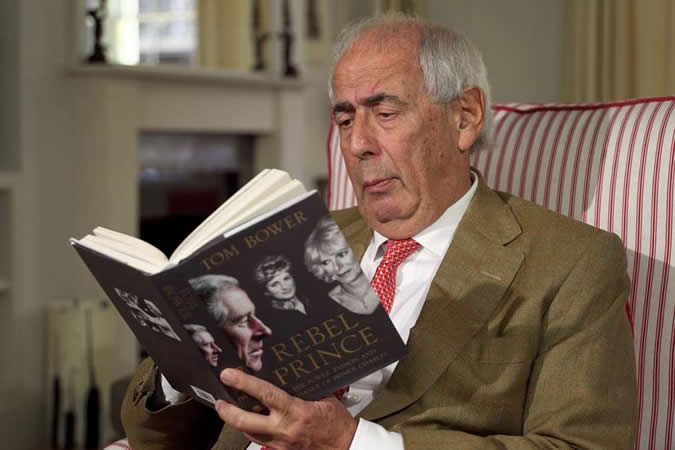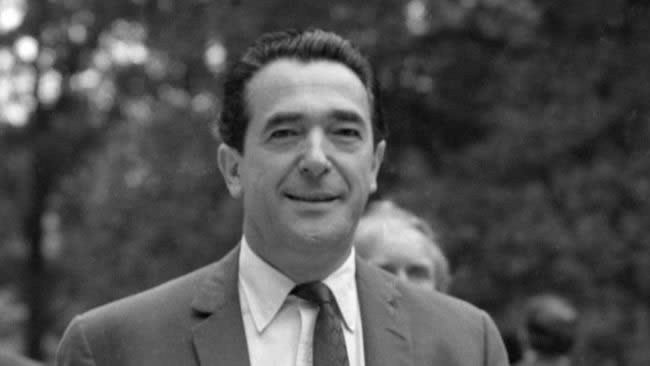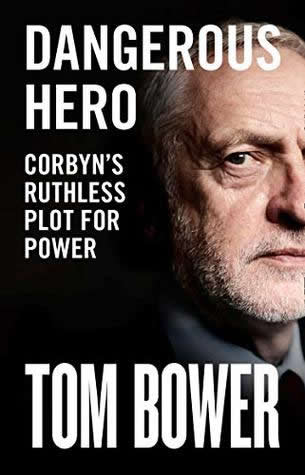
Unlike Oprah, Tom Bower’s unauthorized Meghan Markle biography will pull no punches

For a public figure they must be the five most terrifying words in the language: “Tom Bower’s writing your biography”. So there’s likely to be wailing and gnashing of teeth in Montecito today with the news that Bower has signed a six-figure deal to write the unofficial life of the Duchess of Sussex.
The book is likely to present a very different reading experience for the Duchess than last year’s joint biography of herself and her husband, Finding Freedom by Omid Scobie and Carolyn Durand. If that treacly hagiography was a soothing ego-massage, Bower’s book will feel more like going 10 rounds with Tyson Fury.
Bower has a reputation for taking no prisoners – one critic has called him “the undisputed Witchfinder General of contemporary biographers”. His twin specialities are mega-rich entrepreneurs (Robert Maxwell, Branson, Simon Cowell) and politicians (Blair, Brown, Corbyn, Johnson). But whoever he writes about, few readers come away with the impression that they’ve been reading about a thoroughly decent sort.
He’s been said to specialise in “men with something to hide”. Meghan Markle will be a rare female subject, but one assumes he wouldn’t be bothering with her unless he thought she had secrets to ferret out. It’s a safe bet that he won’t ignore the anomalies in the Duchess’s account of the past few years’ events, as Oprah Winfrey conspicuously did.
It won’t be Bower’s first attempt at a royal biography. He’s already given Meghan’s father-in-law a going-over in the uncompromisingly titled Rebel Prince: The Power, Passion and Defiance of Prince Charles (2018).
The critic Craig Brown, in The Mail on Sunday, quoted the entries in the index under Charles’s character in their entirety: “refusal to accept blame; self-doubt; disloyalty; victims of; dislike of criticism/dissenting views; scapegoats; self-pity; intolerance/bad temper; sense of superiority; grudges; selfishness; resentment of Diana; derogatory comments about Diana; on himself; discourteousness.” As Brown noted, not a single positive characteristic got a look-in.

The book also claimed to have unearthed private remarks that Camilla Parker Bowles (as she then was) made about Diana, Princess of Wales when the latter was alive – among them, that she was a “mad cow”.
And yet despite Bower’s clear antipathy to the Prince of Wales, I’m not going to bet on his taking Meghan’s side against Charles. In an article in The Sun earlier this month, Bower launched a broadside against her.
“Convinced of her own greatness, Meghan thinks she has, for years, been the victim of plots to destroy her destiny. While others shone in leading roles, Meghan had bit parts,” he declared, adding that after she was written out of the television series Suits, she “brilliantly… invented a new script” and “ruthlessly” carried out a carefully planned scheme to ensnare Prince Harry. In his view, Meghan never intended to “sacrifice her Californian lifestyle and serve as a member of the Royal Family in rainy Britain” for long.
“Refusing to show son Archie’s face to the camera after his birth and demanding privacy, while constantly speaking to US journalists, confirmed her hypocrisy,” he went on, before comparing her unfavourably with Wallis Simpson (“[unlike] the Duke and Duchess of Windsor… Meghan and Harry clearly do not care about the uproar they are causing”).
His final complaint is that “in her selfish manner, she believes that she is entitled to say what she wants to Oprah Winfrey [and] those who criticise her inventions are racist and sexist.” Nobody is going to mistake his biography for a love letter, I imagine.
Of course any number of newspaper columnists have spouted hot air about Meghan’s supposed hypocrisy and perfidy. The reason Bower is such a terrifying prospect is that he does the legwork to back up his assertions.
One doubts he will take the Piers Morgan line of directly accusing the Duchess of ‘lying’ in her claims to have suffered from mental illness – not out of sensitivity to the current national conversation about mental health, but because it would be an accusation very difficult to prove. Bower will not lash out in anger, but base any accusations he makes on the testimony of the eyewitnesses he tracks down.
He has already said he will spend a year working on the book, and he will use that time to the full. It’s a luxury for an investigative journalist to have that much time to spend on a single project, but Bower is able to do so because his biographies bring in a lot of money – not just because the gossip-hungry reading public buys them in droves, but also because newspapers pay huge sums for the serialisation rights.
And the more successful Bower becomes, the more people want to talk to him, and the better the scoops get. It’s true that he’s rarely granted interviews with his subjects these days – earlier in his career he got more material straight from the horse’s mouth. But it soon became clear that Mohamed Al-Fayed, Richard Branson or Simon Cowell were not getting to control the book’s narrative just because they gave Bower a lot of help; his subjects have generally stopped agreeing to collaborate.

Bower, however, has said that he actually prefers to work without his subject’s cooperation – or, indeed, approval. In his view, the ability to read and understand company accounts, or a nose for the former employee who might have reasons to feel disloyal, are more valuable than hours spent closeted with the star of the book. That’s fortunate, as a spokesman for the Duchess has made it clear already that she won’t be speaking to Bower.
So who is Bower? The 74-year-old author – whose long, mournful face has often been cited as perfectly suited to the bloodhound of modern biography – was born in London as Thomas Bauer, the son of Jewish refugees from Prague; “politics and history were there with my mother’s milk,” he once said. He was called to the Bar at Gray’s Inn in 1969, but soon left the law: “It was so class-ridden and depressing, and I realised what I really wanted to do was see things and travel and write about things.”
He then spent 25 years at the BBC, notably as a producer on Panorama, where he gained a reputation as a demanding colleague who would stop at nothing to make striking television journalism. For one story involving dodgy goings-on at a care home, he wanted to film the funeral of one of the residents, but the home’s owners kept the crew out; so he bribed the gravediggers afterwards to raise the coffin and then rebury it on camera.
On another occasion, when his crew confronted a sheep farmer accused of maltreating animals, the man caught hold of Bower with his crook and beat him up. “He just stood there, rather in the pose of Jesus Christ, and took it all,” a colleague recalled. “I suppose he knew it would make the film that much more dramatic.”
Bower started to make his name as an author with books on Nazis, notably The Paperclip Conspiracy (1987), in which he railed against the way in which Nazi rocket scientists were absolved for war crimes if they offered their services to the Allies’ nuclear weapons programmes.

He left the BBC in 1995, claiming to be outraged that a film he made about Robert Maxwell was de-fanged by the Corporation’s lawyers. He has rarely missed an opportunity since to complain about how Panorama and the rest of the BBC’s current affairs output has been “Birtised into banality” – John Birt being in his view “a Stalinist vandal who destroyed the old guard’s journalistic legacy”.
Meanwhile he went from strength to strength as a biographer – although this was not necessarily the view of his subjects. Robert Maxwell launched numerous lawsuits against Bower, who claims that Maxwell had private detectives break into his house and go through his records; and although Bower’s Maxwell: The Outsider (1991) was a huge success in hardback, Maxwell delayed the paperback edition by buying the publishing company that held the rights. After Maxwell’s death, Bower’s assertions about his questionable business dealings were fully vindicated.
Bower’s sharply critical 2000 biography of Richard Branson was widely thought to have scuppered Branson’s bid to run the National Lottery. Branson, who unsuccessfully sued Bower, declared of the biography: “What I have read has offended me on every single level … It is a foul, foul piece of work from the first words to the last – really rotten, nasty stuff,” – a quote that was proudly included on the book jacket.
Bower has since published a further volume on Branson, insisting that the Virgin tycoon is nowhere near as successful as he claims to be: “if he’s a billionaire why would he rent out his home on Necker? What other billionaire rents out their home? It’s like a bed and breakfast. It’s ridiculous,” Bower told the New Statesman.
Further legal trouble ensued after Bower published Dancing on the Edge (2005), a biography of the Canadian media tycoon Conrad Black and his wife Barbara Amiel. Black’s threats of legal action were curtailed by his conviction for fraud, but another media mogul, Richard Desmond, sued Bower over the way he was portrayed in the book. As usual, Bower was victorious in court, and afterwards the jurors mobbed Bower and asked him to sign their copies of his book; it’s obviously not easy to convince juries that Britain’s foremost crusading biographer should be put in his place.
What drives Bower? “He struck me as messianic, almost to the point of being unbalanced,” the Labour politician Geoffrey Robinson, subject of The Paymaster (2001), observed of his first meeting with Bower. But Bower’s zealous pursuit of anything he regards as unethical sometimes sits uneasily alongside his prurience when writing about sexual scandals – he’s not one for passing over the juicy details in silence. One sometimes wonders how proud he can be of some of his books – can he really have shared the newspapers’ excitement about his revelation that Simon Cowell once had an affair with his fellow X Factor judge Dannii Minogue?
Opinion remains divided about Bower. Readers love his books and many of his fellow journalists admire him: “The only problem with journalists like Tom Bower is that there are not enough of them,” John Humphrys has said.

But there has been criticism. The late Guardian editor Peter Preston said of his books: “you need a little human understanding in the mix as well. And that … is not Bower’s forte.” The Independent on Sunday quoted an anonymous academic in 2007 as saying: “There is a theory among some senior journalists and documentary makers that he has gone off the boil recently and replaced the evidence-gathering with which he made his name with bile and innuendo.”
The Right-leaning journalist Peter Oborne denounced Bower’s 2019 biography of Jeremy Corbyn as far too one-sided: “[it] systematically omits relevant facts in order to portray Corbyn as a ruthless Marxist and antisemite hellbent on destroying western liberal values.” His recent biography of Boris Johnson, The Gambler, was, conversely, accused by some of pulling its punches.
Bower’s views on these matters are unknown; he rarely talks to journalists, saying he does not wish to give his enemies ammunition against him by going on the public record. He lives quietly in Hampstead and Wiltshire – where he is said to be in with the horsey set. His wife is Veronica Wadley, former editor of the Evening Standard and subsequently an advisor to Boris Johnson when he was Mayor of London; last year she was made a Conservative peer under the appropriately journalistic title of Baroness Fleet.
My own advice to the Duchess of Sussex would be to follow Bower’s example and keep her own counsel: anything negative she says about him will only end up adorning the book jacket. And legal action would probably not be a wise move. As Bower once observed, “Robert Maxwell sued me many times – and look what happened to him.”
